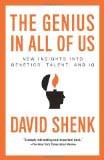 Loading... Please wait...
Loading... Please wait...Categories
- Home
- Our Favorite Books & other Media
- David Shenk
- The Genius in All of Us: New Insights into Genetics, Talent, and IQ
The Genius in All of Us: New Insights into Genetics, Talent, and IQ
Product Description
The Genius in All of Us: New Insights into Genetics, Talent, and IQ
By: David Shenk
David Shenk's, The Genius in All of Us, has special appeal to the CR Way Brain Booster members. The Brain Booster program uses the fundamentals of calorie restriction, which has een shown to produce beneficial cognitive change along with regular practice to make beneficial, physciological changes in the brain. The results have been phenomenal. Many members report significant improvements in memory and other cognitive skills. Our Brain Booster members are confirmation of the principles Shenk describes for improving intelligence and other skills.
This review from Amazon describes more:
With irresistibly persuasive vigor, David Shenk debunks the long-standing notion of genetic “giftedness,” and presents dazzling new scientific research showing how greatness is in the reach of every individual.
DNA does not make us who we are. “Forget everything you think you know about genes, talent, and intelligence,” he writes. “In recent years, a mountain of scientific evidence has emerged suggesting a completely new paradigm: not talent scarcity, but latent talent abundance.”
Integrating cutting-edge research from a wide swath of disciplines—cognitive science, genetics, biology, child development—Shenk offers a highly optimistic new view of human potential. The problem isn't our inadequate genetic assets, but our inability, so far, to tap into what we already have. IQ testing and widespread acceptance of “innate” abilities have created an unnecessarily pessimistic view of humanity—and fostered much misdirected public policy, especially in education.
The truth is much more exciting. Genes are not a “blueprint” that bless some with greatness and doom most of us to mediocrity or worse. Rather our individual destinies are a product of the complex interplay between genes and outside stimuli-a dynamic that we, as people and as parents, can influence.
This is a revolutionary and optimistic message. We are not prisoners of our DNA. We all have the potential for greatness."
What an excellent resource for brain improvement The Genius in All of Us, is!
Product Reviews
-
How to make a powerful difference in *your* brain power

Posted by Paige Collins-Rideout on 9th Jul 2012
This excerpt is really interesting, especially in reference to our Brain Booster challenge. The book citation is at the bottom.
*Practice.* Rather than being the result of genetics or inherent genius, truly outstanding skill in any domain is rarely achieved with less than ten thousand hours of practice over ten years' time.
"For those on their way to greatness [in intellectual or physical endeavors], several themes regarding practice consistently come to light:
1. Practice changes your body. Researchers have recorded a constellation of physical changes (occurring in direct response to practice) in the muscles, nerves, hearts, lungs, and brains of those showing profound increases in skill level in any domain.
2. Skills are specific. Individuals becoming great at one particular skill do not serendipitously become great at other skills. Chess champions can remember hundreds of intricate chess positions in sequence but can have a perfectly ordinary memory for everything else. Physical and intellectual changes are ultraspecific responses to particular skill requirements.
3. The brain drives the brawn. Even among athletes, changes in the brain are arguably the most profound, with a vast increase in precise task knowledge, a shift from conscious analysis to intuitive thinking (saving time and energy), and elaborate self-monitoring mechanisms that allow for constant adjustments in real time.
4. Practice style is crucial. Ordinary practice, where your current skill level is simply being reinforced, is not enough to get better. It takes a special kind of practice to force your mind and body into the kind of change necessary to improve.
5. Short-term intensity cannot replace long-term commitment. Many crucial changes take place over long periods of time. Physiologically, it's impossible to become great overnight.
"Across the board, these last two variables -- practice style and practice time -- emerged as universal and critical. From Scrabble players to dart players to soccer players to violin players, it was observed that the uppermost achievers not only spent significantly more time in solitary study and drills, but also exhibited a consistent (and persistent) style of preparation that K. Anders Ericsson came to call 'deliberate practice.' First introduced in a 1993Psychological Review article, the notion of deliberate practice went far beyond the simple idea of hard work. It conveyed a method of continual skill improvement. 'Deliberate practice is a very special form of activity that differs from mere experience and mindless drill,' explains Ericsson. 'Unlike playful engagement with peers, deliberate practice is not inherently enjoyable. It ... does not involve a mere execution or repetition of already attained skills but repeated attempts to reach beyond one's current level which is associated with frequent failures.' ...
"In other words, it is practice that doesn't take no for an answer; practice that perseveres; the type of practice where the individual keeps raising the bar of what he or she considers success. ...
"[Take] Eleanor Maguire's 1999 brain scans of London cabbies, which revealed greatly enlarged representation in the brain region that controls spatial awareness. The same holds for any specific task being honed; the relevant brain regions adapt accordingly. ...
"[This type of practice] requires a constant self-critique, a pathological restlessness, a passion to aim consistently just beyond one's capability so that daily disappointment and failure is actually desired, and a never-ending resolve to dust oneself off and try again and again and again. ...
"The physiology of this process also requires extraordinary amounts of elapsed time -- not just hours and hours of deliberate practice each day, Ericsson found, but also thousands of hours over the course of many years. Interestingly, a number of separate studies have turned up the same common number, concluding that truly outstanding skill in any domain is rarely achieved in less than ten thousand hours of practice over ten years' time (which comes to an average of three hours per day). From sublime pianists to unusually profound physicists, researchers have been very hard-pressed to find any examples of truly extraordinary performers in any field who reached the top of their game before that ten-thousand-hour mark."
Author: David Shenk
Title: The Genius in All of Us
Publisher: Anchor
Date: Copyright 2010 by David Shenk
Pages: 53-57







